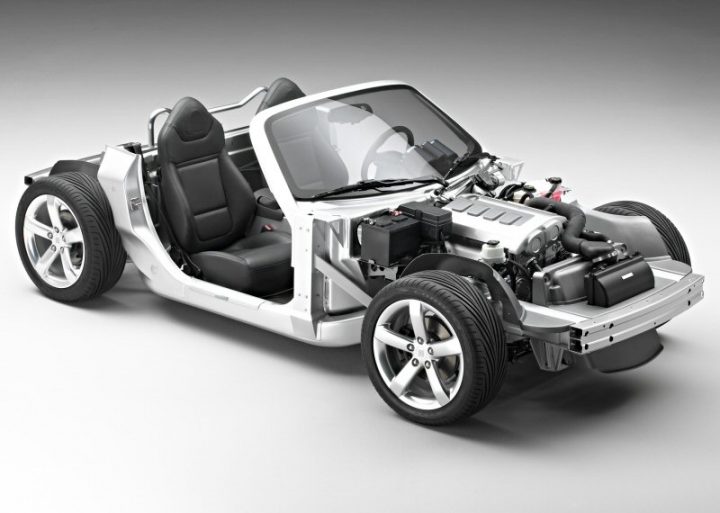The GM Kappa engine series represents a significant milestone in the automotive industry, showcasing General Motors' commitment to innovation and efficiency. As one of the most advanced engine families developed by GM, the Kappa series has been engineered to meet the demands of modern vehicles while maintaining performance and reliability. This article dives deep into the world of GM Kappa engines, exploring their features, applications, and impact on the automotive landscape.
Whether you're an automotive enthusiast or a professional mechanic, understanding the GM Kappa engine is essential. This engine series has been widely adopted in various GM vehicles, making it a crucial component in the company's lineup. By examining its design, performance, and applications, we can better appreciate the technology behind this remarkable engine.
In this article, we will explore the history, specifications, and applications of the GM Kappa engine. We will also discuss its impact on the automotive industry and how it has contributed to the development of more efficient and reliable vehicles. Let's begin our journey into the world of GM Kappa engines.
Read also:Kirstentoosweet Leak
Table of Contents
- Introduction to GM Kappa Engines
- A Brief History of GM Kappa Engines
- Design and Engineering Features
- Key Specifications of the GM Kappa Engine
- Applications in GM Vehicles
- Performance Highlights
- Fuel Efficiency and Environmental Impact
- Maintenance and Longevity
- Comparison with Other Engine Series
- The Future of GM Kappa Engines
Introduction to GM Kappa Engines
The GM Kappa engine series is a testament to General Motors' dedication to innovation and efficiency in the automotive industry. Introduced in the early 2000s, this engine family has been designed to power a wide range of vehicles, from compact cars to mid-size SUVs. The Kappa series is known for its lightweight construction, compact design, and impressive performance.
Key Features of the GM Kappa Engine
One of the standout features of the GM Kappa engine is its use of aluminum components, which significantly reduce weight and improve fuel efficiency. Additionally, the engine incorporates advanced technologies such as variable valve timing and direct fuel injection, enhancing both performance and economy.
Another notable aspect of the Kappa series is its versatility. The engine is available in various configurations, including inline-three and inline-four cylinder options, catering to different vehicle requirements. This flexibility has made the Kappa engine a popular choice for GM's global lineup.
A Brief History of GM Kappa Engines
The development of the GM Kappa engine began in the late 1990s, with the goal of creating a new engine family that could compete with the best in the industry. After years of research and development, the first Kappa engine was introduced in 2005, powering the Chevrolet Aveo and other compact vehicles.
Read also:Sam Frank Leaks
Evolution of the Kappa Series
- 2005: Initial release of the Kappa engine in compact vehicles.
- 2010: Introduction of updated versions with improved fuel efficiency.
- 2015: Expansion into mid-size SUVs and crossover vehicles.
Throughout its history, the GM Kappa engine has undergone several updates and improvements, ensuring it remains competitive in the ever-evolving automotive market.
Design and Engineering Features
The design of the GM Kappa engine reflects GM's commitment to innovation and efficiency. The engine's lightweight construction, compact size, and advanced technologies make it an ideal choice for modern vehicles.
Advanced Technologies in the Kappa Engine
- Aluminum block and head for reduced weight.
- Variable valve timing for improved performance and efficiency.
- Direct fuel injection for enhanced combustion and fuel economy.
These features not only contribute to the engine's performance but also ensure better fuel efficiency and reduced emissions, making it an environmentally friendly choice.
Key Specifications of the GM Kappa Engine
The GM Kappa engine comes in several configurations, each tailored to specific vehicle requirements. Below are some of the key specifications of the Kappa series:
- Engine Type: Inline-three and Inline-four cylinder.
- Displacement: 1.2L to 1.6L.
- Horsepower: 85hp to 130hp.
- Torque: 95Nm to 160Nm.
These specifications make the Kappa engine suitable for a wide range of applications, from city commuting to long-distance travel.
Applications in GM Vehicles
The GM Kappa engine has been widely adopted in various GM vehicles, including compact cars, mid-size SUVs, and crossover vehicles. Some of the popular models powered by the Kappa engine include:
Popular GM Vehicles with Kappa Engines
- Chevrolet Aveo.
- Chevrolet Spark.
- GMC Terrain.
- Chevrolet Trax.
These vehicles benefit from the Kappa engine's lightweight design, advanced technologies, and impressive performance, making them popular choices among consumers.
Performance Highlights
The GM Kappa engine is renowned for its performance, offering a perfect balance between power and efficiency. The engine's advanced technologies ensure smooth operation and responsive handling, making it an ideal choice for modern vehicles.
Performance Features of the Kappa Engine
- Quick acceleration thanks to direct fuel injection.
- Smooth operation due to variable valve timing.
- Responsive handling in various driving conditions.
These performance features make the Kappa engine a favorite among drivers who value both power and efficiency.
Fuel Efficiency and Environmental Impact
One of the key advantages of the GM Kappa engine is its excellent fuel efficiency. The engine's lightweight construction, advanced technologies, and precise engineering contribute to reduced fuel consumption and lower emissions.
Environmental Benefits of the Kappa Engine
- Improved fuel economy compared to traditional engines.
- Reduced carbon emissions due to efficient combustion.
- Compliance with global emission standards.
By choosing vehicles powered by the Kappa engine, consumers can enjoy the benefits of reduced fuel costs and a smaller environmental footprint.
Maintenance and Longevity
The GM Kappa engine is designed for durability and reliability, ensuring long-term performance with proper maintenance. Regular servicing and adherence to manufacturer recommendations can significantly extend the engine's lifespan.
Tips for Maintaining the Kappa Engine
- Follow the recommended service schedule.
- Use high-quality fuel and oil.
- Inspect and replace components as needed.
By following these maintenance tips, owners can ensure their Kappa-powered vehicles remain in optimal condition for years to come.
Comparison with Other Engine Series
When compared to other engine series, the GM Kappa engine stands out for its lightweight design, advanced technologies, and excellent fuel efficiency. While other engines may offer similar performance, the Kappa series excels in terms of versatility and adaptability.
Key Differences Between Kappa and Other Engines
- Lightweight construction for improved efficiency.
- Advanced technologies for enhanced performance.
- Versatile applications across various vehicle types.
These differences make the Kappa engine a standout choice for modern vehicles, offering a unique combination of power, efficiency, and reliability.
The Future of GM Kappa Engines
As the automotive industry continues to evolve, the GM Kappa engine is expected to play a significant role in shaping the future of vehicle propulsion. With ongoing research and development, GM is committed to improving the Kappa series, incorporating new technologies and features to enhance performance and efficiency.
Potential Developments in the Kappa Engine
- Incorporation of hybrid and electric technologies.
- Further improvements in fuel efficiency and emissions.
- Expansion into new vehicle segments and markets.
The future of the GM Kappa engine looks promising, with continued innovation and advancements ensuring its relevance in the automotive industry.
Conclusion
In conclusion, the GM Kappa engine series represents a significant achievement in the automotive industry, offering a unique combination of performance, efficiency, and reliability. By exploring its history, design, applications, and impact, we have gained a deeper understanding of this remarkable engine and its importance in modern vehicles.
We invite you to share your thoughts and experiences with the GM Kappa engine in the comments section below. Additionally, feel free to explore other articles on our site for more insights into the world of automotive technology. Together, let's continue to learn and grow in our appreciation of the vehicles that shape our lives. Thank you for reading!


